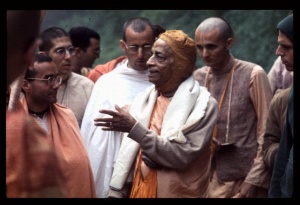CC Madhya 24.326: Difference between revisions
m (1 revision(s)) |
No edit summary |
||
| Line 1: | Line 1: | ||
{{ | [[Category:Sri Caitanya-caritamrta - Madhya-lila Chapter 24|C326]] | ||
<div style="float:left">'''[[Sri Caitanya-caritamrta|Śrī Caitanya-caritāmṛta]] - [[CC Madhya|Madhya-līlā]] - [[CC Madhya 24|Chapter 24: The Sixty-One Explanations of the Atmārāma Verse]]'''</div> | |||
<div style="float:right">[[File:Go-previous.png|link=CC Madhya 24.325|Madhya-līlā 24.325]] '''[[CC Madhya 24.325|Madhya-līlā 24.325]] - [[CC Madhya 24.327|Madhya-līlā 24.327]]''' [[File:Go-next.png|link=CC Madhya 24.327|Madhya-līlā 24.327]]</div> | |||
{{CompareVersions|CC|Madhya 24.326|CC 1975|CC 1996}} | |||
{{RandomImage}} | |||
==== TEXT 326 ==== | ==== TEXT 326 ==== | ||
<div | <div class="verse"> | ||
sūtra | :sūtra kari' diśā yadi karaha upadeśa | ||
āpane karaha yadi hṛdaye praveśa | :āpane karaha yadi hṛdaye praveśa | ||
</div> | </div> | ||
| Line 12: | Line 16: | ||
==== SYNONYMS ==== | ==== SYNONYMS ==== | ||
<div | <div class="synonyms"> | ||
sūtra | ''sūtra kari'' '—making a synopsis; ''diśā''—direction; ''yadi''—if; ''karaha upadeśa''—You kindly instruct; ''āpane''—personally; ''karaha''—You do; ''yadi''—if; ''hṛdaye praveśa''—entering into me or manifesting in my heart. | ||
</div> | </div> | ||
| Line 19: | Line 23: | ||
==== TRANSLATION ==== | ==== TRANSLATION ==== | ||
<div | <div class="translation"> | ||
Sanātana Gosvāmī then requested the Lord, | Sanātana Gosvāmī then requested the Lord, "Please personally tell me how I can write this difficult book about Vaiṣṇava behavior. Please manifest Yourself in my heart. | ||
</div> | </div> | ||
| Line 26: | Line 30: | ||
==== PURPORT ==== | ==== PURPORT ==== | ||
<div | <div class="purport"> | ||
The writing of Vaiṣṇava literatures is not a function for ordinary men. Vaiṣṇava literatures are not mental concoctions. They are all authorized literatures meant to guide those who are going to be Vaiṣṇavas. Under these circumstances, an ordinary man cannot give his own opinion. His opinion must always correspond with the conclusion of the Vedas. Unless one is fully qualified in Vaiṣṇava behavior and authorized by superior authority (the Supreme Personality of Godhead), one cannot write Vaiṣṇava literatures or purports and commentaries on Śrīmad-Bhāgavatam and the Bhagavad-gītā. | The writing of Vaiṣṇava literatures is not a function for ordinary men. Vaiṣṇava literatures are not mental concoctions. They are all authorized literatures meant to guide those who are going to be Vaiṣṇavas. Under these circumstances, an ordinary man cannot give his own opinion. His opinion must always correspond with the conclusion of the ''Vedas''. Unless one is fully qualified in Vaiṣṇava behavior and authorized by superior authority (the Supreme Personality of Godhead), one cannot write Vaiṣṇava literatures or purports and commentaries on [[Srimad-Bhagavatam|''Śrīmad-Bhāgavatam'']] and the [[Bhagavad-gita As It Is (1972)|''Bhagavad-gītā'']]. | ||
</div> | </div> | ||
__NOTOC__ | |||
<div style="float:right; clear:both;">[[File:Go-previous.png|link=CC Madhya 24.325|Madhya-līlā 24.325]] '''[[CC Madhya 24.325|Madhya-līlā 24.325]] - [[CC Madhya 24.327|Madhya-līlā 24.327]]''' [[File:Go-next.png|link=CC Madhya 24.327|Madhya-līlā 24.327]]</div> | |||
__NOTOC__ | |||
__NOEDITSECTION__ | |||
Revision as of 13:44, 15 September 2021

A.C. Bhaktivedanta Swami Prabhupada
TEXT 326
- sūtra kari' diśā yadi karaha upadeśa
- āpane karaha yadi hṛdaye praveśa
SYNONYMS
sūtra kari '—making a synopsis; diśā—direction; yadi—if; karaha upadeśa—You kindly instruct; āpane—personally; karaha—You do; yadi—if; hṛdaye praveśa—entering into me or manifesting in my heart.
TRANSLATION
Sanātana Gosvāmī then requested the Lord, "Please personally tell me how I can write this difficult book about Vaiṣṇava behavior. Please manifest Yourself in my heart.
PURPORT
The writing of Vaiṣṇava literatures is not a function for ordinary men. Vaiṣṇava literatures are not mental concoctions. They are all authorized literatures meant to guide those who are going to be Vaiṣṇavas. Under these circumstances, an ordinary man cannot give his own opinion. His opinion must always correspond with the conclusion of the Vedas. Unless one is fully qualified in Vaiṣṇava behavior and authorized by superior authority (the Supreme Personality of Godhead), one cannot write Vaiṣṇava literatures or purports and commentaries on Śrīmad-Bhāgavatam and the Bhagavad-gītā.